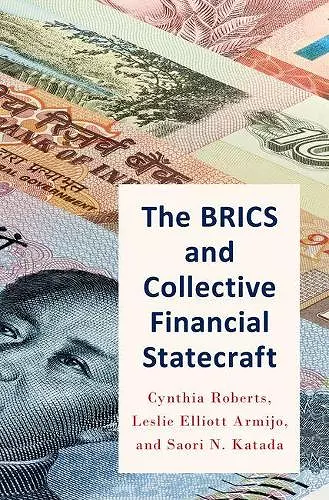The BRICS and Collective Financial Statecraft
Cynthia Roberts author Leslie Elliott Armijo author Saori Katada author
Format:Hardback
Publisher:Oxford University Press Inc
Published:7th Dec '17
Currently unavailable, and unfortunately no date known when it will be back
This hardback is available in another edition too:
- Paperback£37.99(9780190697525)

In the first decade of the 21st century, five rising powers (Brazil, Russia, India, China, and South Africa) formed an exclusive and informal international club, the BRICS. Although neither revolutionaries nor extreme revisionists, the BRICS perceive an ongoing global power shift and contest the West's pretensions to permanent stewardship of the existing economic order. Together they have exercised collective financial statecraft, employing their expanding financial and monetary capabilities for the purpose of achieving larger foreign policy goals. This volume examines the forms and strategies of such collective financial statecraft, and the motivations of each individual government for collaborating through the BRICS club. Their cooperative financial statecraft takes various forms, ranging from pressure for "inside reforms" of either multilateral institutions or global markets, to "outside options" exercised through creating new multilateral institutions or jointly pushing for new realities in international financial markets. To the surprise of many observers, the joint actions of the BRICS are largely successful. Although each member has its unique rationale for collaboration, the largest member, China, controls resources that permit it the greatest influence in intra-club decision-making. The BRICS cooperate due to both common aversions (for example, resentment over being perennial junior partners in global economic and financial governance and resistance to infringements on their autonomy due to U.S. dollar dominance and financial power) and common interests (such as obtaining greater voice in international institutions, as the IMF). The group seeks reforms, influence, and enhanced leadership roles within the liberal capitalist global system. Where blocked, they experiment with parallel multilateral institutions in which they are the dominant rule-makers. The future of the BRICS depends not only on their bargaining power and adjustment to market players, but also on their ability to overcome domestic impediments to sustainable economic growth, the basis for their international influence.
This book provides an authoritative, comprehensive, and lucid account of the rise of the BRICS. A compelling narrative about how a group of economies, which have some congruent interests but are simultaneously competitors in many other areas, have set aside their differences and come together as a force to reckon with in global finance. * Eswar Prasad, Tolani Senior Professor of Trade Policy, Cornell University, and Senior Fellow at the Brookings Institution *
Here is a book that sceptics of the BRICS must read. Through careful and nuanced analysis, the authors show why no serious analyst of global financial governance can ignore this grouping any longer. * Eric Helleiner, Professor of Political Science, University of Waterloo *
Daniel McDowell's book, Bucking the Buck: US Financial Sanctions and the International Backlash against the Dollar, makes a revelatory contribution from the US' perspective built upon meticulous case assessments and empirical analyses. * China International Strategy Review *
ISBN: 9780190697518
Dimensions: 160mm x 236mm x 23mm
Weight: 601g
288 pages